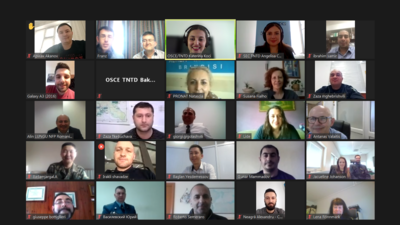-
Our work
-
Fields of work
- Arms control
- Border management
- Combating trafficking in human beings
- Conflict prevention and resolution
- Countering terrorism
- Cyber/ICT Security
- Democratization
- Economic activities
- Education
- Elections
- Environmental activities
- Gender equality
- Good governance
- Human rights
- Media freedom and development
- Migration
- National minority issues
- Policing
- Reform and co-operation in the security sector
- Roma and Sinti
- Rule of law
- Tolerance and non-discrimination
- Youth
- Field operations
- Projects
-
Meetings and conferences
- Summit meetings
- Review Conferences
- Ministerial Council meetings
- Plenary meetings of the Permanent Council
- Plenary Meetings of the Forum for Security Co-operation
- Security Review Conferences
- Annual Implementation Assessment Meetings
- Economic and Environmental Forum
- Economic and Environmental Dimension Implementation Meetings
- Human rights meetings
- Media conferences
- Cyber/ICT security conferences
- Conference of the Alliance against Trafficking in Persons
- Gender equality conferences
- Annual OSCE Mediterranean conferences
- Annual OSCE Asian conferences
- Partnerships
-
Fields of work
-
Countries
- All
-
Participating States
- Albania
- Andorra
- Armenia
- Austria
- Azerbaijan
- Belgium
- Belarus
- Bosnia and Herzegovina
- Bulgaria
- Canada
- Croatia
- Cyprus
- Czechia
- Denmark
- Estonia
- Finland
- France
- Georgia
- Germany
- Greece
- Holy See
- Hungary
- Iceland
- Ireland
- Italy
- Kazakhstan
- Kyrgyzstan
- Latvia
- Liechtenstein
- Lithuania
- Luxembourg
- Malta
- Moldova
- Monaco
- Mongolia
- Montenegro
- The Netherlands
- North Macedonia
- Norway
- Poland
- Portugal
- Romania
- Russian Federation
- San Marino
- Serbia
- Slovakia
- Slovenia
- Spain
- Sweden
- Switzerland – OSCE Chairpersonship 2026
- Tajikistan
- Türkiye
- Turkmenistan
- Ukraine
- United Kingdom
- United States of America
- Uzbekistan
- Asian Partners for Co-operation
- Mediterranean Partners for Co-operation
-
Structures and institutions
- Chairpersonship
-
Secretariat
- Secretary General
- Office of the Secretary General
- Conflict Prevention Centre
- Transnational Threats Department
- Office of the Special Representative and Co-ordinator for Combating Trafficking in Human Beings
- Office of the Co-ordinator of OSCE Economic and Environmental Activities
- Gender Issues Programme
- Opportunities for Youth
- Department of Human Resources
- Department of Management and Finance
- Office of Internal Oversight
- Documentation Centre in Prague
- Institutions
-
Field operations
- Presence in Albania
- Centre in Ashgabat
- Programme Office in Astana
- Programme Office in Bishkek
- Mission to Bosnia and Herzegovina
- Programme Office in Dushanbe
- Mission in Kosovo
- Mission to Moldova
- Mission to Montenegro
- Mission to Serbia
- Mission to Skopje
- Project Co-ordinator in Uzbekistan
- Closed field activities
- Parliamentary Assembly
- Court of Conciliation and Arbitration
- Organizational structure
- About us
News Item
Second online Training on the Identification of Imposters at Border Crossing Points
Learning how to identify and stop imposters at a border crossing was the focus of an online OSCE training course held on 19 and 20 May 2021. Over 200 participants from 29 OSCE participating States and Partners for Co-operation took part in the course. They comprised members of the OSCE Border Security and Management National Focal Points (NFP) Network and selected representatives of border and customs services.

- Issued on:
- Issued by:
- OSCE Secretariat
- Fields of work:
- Border management
Learning how to identify and stop imposters at a border crossing was the focus of an online OSCE training course held on 19 and 20 May 2021. Over 200 participants from 29 OSCE participating States and Partners for Co-operation took part in the course. They comprised members of the OSCE Border Security and Management National Focal Points (NFP) Network and selected representatives of border and customs services.
The course was organized by the Border Security and Management Unit of the OSCE Transnational Threats Department and was the second online training course on “Identification of Impostors at Border Crossing Points”. Experts of the Austrian Federal Ministry of Interior led the course, which aimed at enhancing the abilities of front-line officers to identify potential criminals travelling under a false identity.
“Activities in the field of document and identity fraud are one of the most significant tools to counter illegal movement of terrorists, criminals and traffickers of all kinds. It is important to be ready to respond to major challenges, such as impostors and attacks using morphed face images, and be able to identify new types of forgeries, including those connected to COVID-19 related documents,” said Dennis Cosgrove, Head of the OSCE Border Security and Management Unit, in his opening remarks.
“Impostors represent one of the main challenges in the field of identity fraud. Despite improved travel documents and security features, stricter controls on documents’ issuance, and strengthened security checks at cross-border check points, identity fraud is on the rise. Criminals are constantly diversifying forging methods as they look for ways to assume false identities without detection,” Cosgrove said.
The training course featured interactive elements, including memory tests and exercises on facial appearance and comparison, as well as lectures and practical modules on anatomical features and examination techniques of facial components.
The course served as a forum for exchanging information on the latest trends related to morphing (a special effect in motion pictures and animations that changes (or morphs) one image or shape into another through a seamless transition) and the use of fraudulent COVID-19 tests and vaccine certificates for travel purposes.
Real examples and cases encountered by participants while performing their duties were presented and discussed during the activities.
This training course is part of a series of activities on the detection of forged travel documents and imposters organized by the OSCE Border Security and Management Unit in different countries that started in 2015.